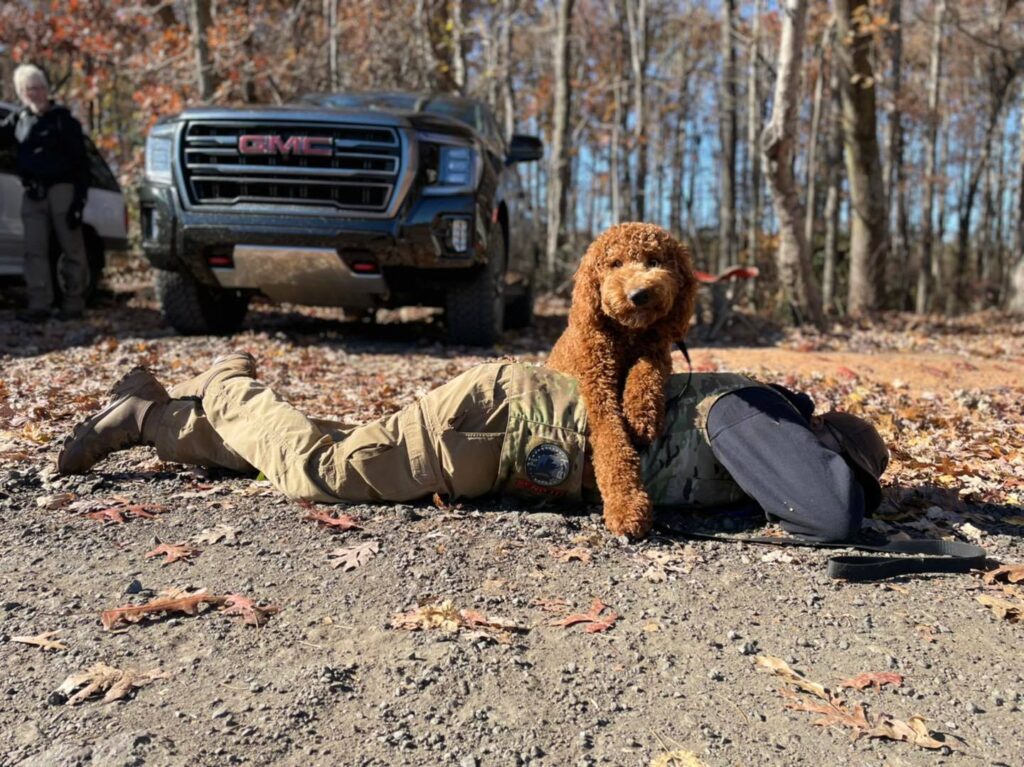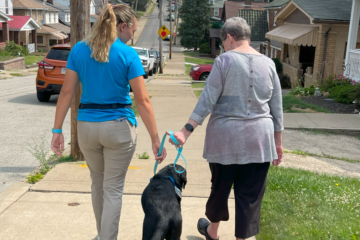When many people visualize a service dog, they will likely imagine a dog helping a handler with a physical disability. Whether it’s heeling alongside a wheelchair and retrieving items at the grocery store, or picking up a pair of fallen keys for an individual with a walker, service dogs are commonly thought to be useful exclusively to people who need physical assistance in their daily lives.
There is, however, an entirely different type of service dog meant not to assist people with their physical limitations, but with psychological ones. These are known as psychiatric service dogs, and they assist handlers who have been diagnosed with issues such as PTSD, clinical depression or severe anxiety disorders. Psychiatric service dogs help their handlers navigate through the challenges of daily life through a variety of tasks meant to help prevent them from suffering a breakdown.
In this article, we’re going to look at what a PTSD Service Dog actually does, and explain some of the tasks they can perform.
What is a PTSD Service Dog?
PTSD service dogs are trained specifically to assist their handlers who are suffering from post-traumatic stress disorder. They aim to avoid situations which may be triggering for their handler, while keeping them from becoming overwhelmed and assisting them to safety if they do become anxious. They help their handlers live as happily and calmly as possible, while providing much needed support if something begins to trigger a breakdown.
Individuals from many different walks of life can suffer from PTSD. Here are a few examples:
- A military veteran
- An abuse or assault survivor
- Any individual who was involved in, or witnessed, a serious accident
PTSD can cause a great deal of anxiety, and living through a highly traumatic experience can alter an individual’s ability to effectively cope with stress. It can result in changes in behavior, in addition to causing anxiety and depression. It also causes intrusive memories, avoidance behaviors, perspective changes and night terrors. PTSD can also cause individuals to isolate themselves from others, which can make the associated symptoms much worse. It is not typically something that self-resolves, and can require years of treatment and help for it to be managed successfully.
A fully-trained PTSD Service Dog can provide many benefits for their handlers and contributes to a higher quality of life. For example, they can improve sleep quality by interrupting a nightmare. They can offer peace of mind to their handler and lead them away from triggering situations. The companionship of a PTSD Service Dog also provides peace of mind and a permanent presence at the handler’s side.
Which tasks can a PTSD Service Dog be trained to perform?
There are a number of tasks which PTSD Service Dogs can do which can help their handlers. As with any service dog task, it is important to ensure these tasks are trained to such an extent that the service animal is able to perform them reliably in a variety of situations.
Deep pressure therapy

In a situation where an individual is overwhelmed, anxious, or in the midst of a panic attack, it may seem like there are few options to help them remain calm. Staying in control of their emotions can be very difficult, particularly when they may experience a situation that triggers the event that caused their PTSD in the first place.
With deep pressure therapy (DPT), the PTSD Service Dog lays across the body of their handler to help relieve the stress. For this to be effective, it goes without saying that the dog needs to be a medium or large-sized breed. The weight and warmth of the dog against the chest or abdomen can have a calming effect which can halt any escalation of the overwhelming emotions.
Medication reminder/item retrieval
There are medications which are approved by the FDA and can be prescribed to individuals with PTSD. Typically, these medications are used to help with mood and anxiety disorders and are often similar medications to those used to treat depression, such as SSRIs (selective serotonin reuptake inhibitors) and SNRIs (serotonin-norepinephrine reuptake inhibitors).
A PTSD Service Dog can be trained to remind their handler to take their medication at a certain time or retrieve an item from an area of the home. For example, when a dog hears a certain alarm sound (perhaps in the middle of the night), they can be trained to notify their handler and prompt them to take their medication.
Tactile stimulation
If an individual is suffering from an anxiety or panic attack, or is otherwise emotionally overwhelmed, a dog can be trained to nudge or lick in order to help alleviate the stress of the situation. This can also provide a distraction from the attack and help to refocus their partner’s attention.
In addition, a dog can be trained to perform tactile stimulation if an individual suffering from PTSD is experiencing a nightmare or flashback scenario. In relation to sleep, a dog can even be trained to turn on a lightswitch which will help to awaken the sufferer from a nightmare.
This list of tasks is not exhaustive. Just like any service animal, a PTSD Service Dog can be trained to perform tasks that will fit with the individual circumstances of their handler.

How to train a PTSD Service Dog
It goes without saying that it is vital to ensure that the PTSD Service Dog can perform the tasks effectively and in a way that their handler can rely upon them. The peace of mind a service dog can provide will quickly deteriorate if the dog does not respond as expected.
Whilst it is possible for any individual with a disability to train their own service dog, it may be difficult for anyone with psychiatric issues to be able to build and maintain a reliable training program which ensures the dog has the desired response to a given situation. With this in mind, investing in a professional service dog trainer is certainly an option worth considering. The trainer should have experience of working with other individuals who have PTSD and be able to tailor the training and task(s) to your circumstances. Make sure to ask for reviews or recommendations before proceeding.
In conclusion
As we have seen with other types of service dogs – such as autism assistance, mobility or seizure alert – the support and assistance these incredible animals can offer is simply astounding.
At Highland Canine Service Dogs, we have extensive experience of all aspects of service dog training – from puppy selection and raising, to training and proofing tasks, all the way to the delivery of the service dog to their forever home.
If you suffer from PTSD and would like to speak to us about whether a PTSD Service Dog is right for you, we would love to hear from you! Simply fill in our contact form, email us or call us on (704) 500-8281 and we will be happy to discuss your situation.



0 Comments